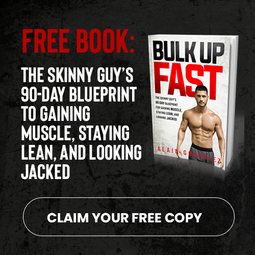
Over the years, peri-workout nutrition has been deemed a nonnegotiable in any bodybuilding diet. “Experts” have labeled pre and post workout meals—or shakes—the holy grail of muscle-building nutrition with which without you’d be doomed to remain skinny and weak.
After all, Arnold ate a pre-workout meal and drank a post-workout shake, so it must be necessary, right?
But let’s take a more objective look at the topic.
The Post-Workout Meal
Most “experts” have proposed that there is a post workout “anabolic window”. This theory suggests that one must consume adequate amounts of protein and fast-acting carbs, 15-30 minutes following their workout, in order to avoid muscle loss.
You see, whenever we work out, we start a process whereby muscle proteins are broken down. The effects are of only moderate severity while you’re in the gym, but it accelerates quickly thereafter.
The goal of the post-workout meal, however, is to mitigate muscle breakdown and, concurrently, stimulate protein synthesis.
Truth is, though, not eating for more than 15-30 minutes following your workout has no negative effects as long as you are consistently meeting your nutrient requirements.
You see, for most of us, this “anabolic window” is actually quite large: 4 to 6 hours, give or take. The reason is simple: food takes several hours to work its way through your system, which means that if you’re eating a good amount of calories, chances are, those nutrients will still be available after your workout.
According to one review, the maximum rate that whey protein can be absorbed is about 8 to 10 grams per hour. Casein clocks in a bit slower at about 6.1 grams per hour, while cooked egg protein seems to take twice as long to absorb than casein and about three times longer than whey (gram for gram).
Long story short, total protein intake—not timing—is what matters most.
Post Workout Carbs
The argument for post workout carbs is twofold: (1) we need to replenish the muscle glycogen that we burned during a workout and (2) it generates an insulin response that blunts muscle breakdown.
The fact is this: 95% of the guys reading this article won’t have to worry about significant glycogen depletion—the other 5% shouldn’t be reading this.
For starters, we’re not performing endless bouts of glycogen depleting training for the same muscle-group. And even if we did manage to burn through a good amount of our energy stores, consuming as many carbs as we should will ensure that they’re replenished in time for our next session anyway.
As for the insulin spike, it’s hogwash. Not because carbs don’t spike insulin, but because protein does, too, to the same level as carbohydrates. More importantly, most of the research we have on the topic shows no significant difference in muscle mass—or strength—between trainees who consume protein and carbs post workout and trainees who had the same protein and carbs at some other time in the day.
Now, this is not to say that it is a bad idea to consume a meal or shake following your workout (which I still recommend you do), it simply suggests that there is no need to speed through traffic on your way home from the gym to beat the window.
The Pre-Workout Meal
 It’s no secret that carbs are an essential fuel for prolonged, strenuous exercise. In fact, research studies have provided evidence that carbohydrate depletion is associated with fatigue and a decrease in exercise intensity.
It’s no secret that carbs are an essential fuel for prolonged, strenuous exercise. In fact, research studies have provided evidence that carbohydrate depletion is associated with fatigue and a decrease in exercise intensity.
A good reason to consume carbohydrates prior to an intense workout, don’t you think?
Consider this, though: while in a growth phase, most individuals are equipped with sufficient energy stores and protein to both perform and preserve muscle mass without having to consume any carbs or protein prior to a workout.
On the other hand, most trainees cannot function 100% in the gym without having a pre-workout meal. Either way, this is totally optional.
What I recommend is this: consider your schedule and how you feel when you do or don’t eat before a workout. From there, make an educated decision as to whether or not you want to include one.
Fasted Training
If you are an individual who trains early in the morning, it’s probably going to be more beneficial for you to consume a pre-workout meal. Training in a truly fasted state, for most people, will inhibit performance; performance being our main training goal if we want to stimulate growth. If you’re anything like me (which is a very rare case) and prefer to train fasted—and perform better in that state—then feel free to do so; however, in this case I would recommend that you do consume a post-workout meal within an hour of your training session; just to be safe. (Read This: The Ultimate Guide to Intermittent Fasting)
A Strong Case for Pre- and Post-Workout Meals
If you’re reading this then you’re probably having a tough time gaining weight and building muscle. That said, choosing to pass on pre and/or post-workout meals, just because they don’t provide any magic benefit, isn’t doing you any favors. You see, your metabolism is extremely adaptive, and thus, you can essentially train your body to be hungry at certain times of the day. If you never eat before your workout, you’re not likely to ever be hungry then.
On the other hand, if you get your body used to having calories right before you hit the gym, you’ll likely begin to experience hunger during that time of the day. The same goes for post workout nutrition. Not only that, but eating a nice sized meal during a point in the day where you’re likely to be hungriest—some would even say ravenous—is probably a good idea.



